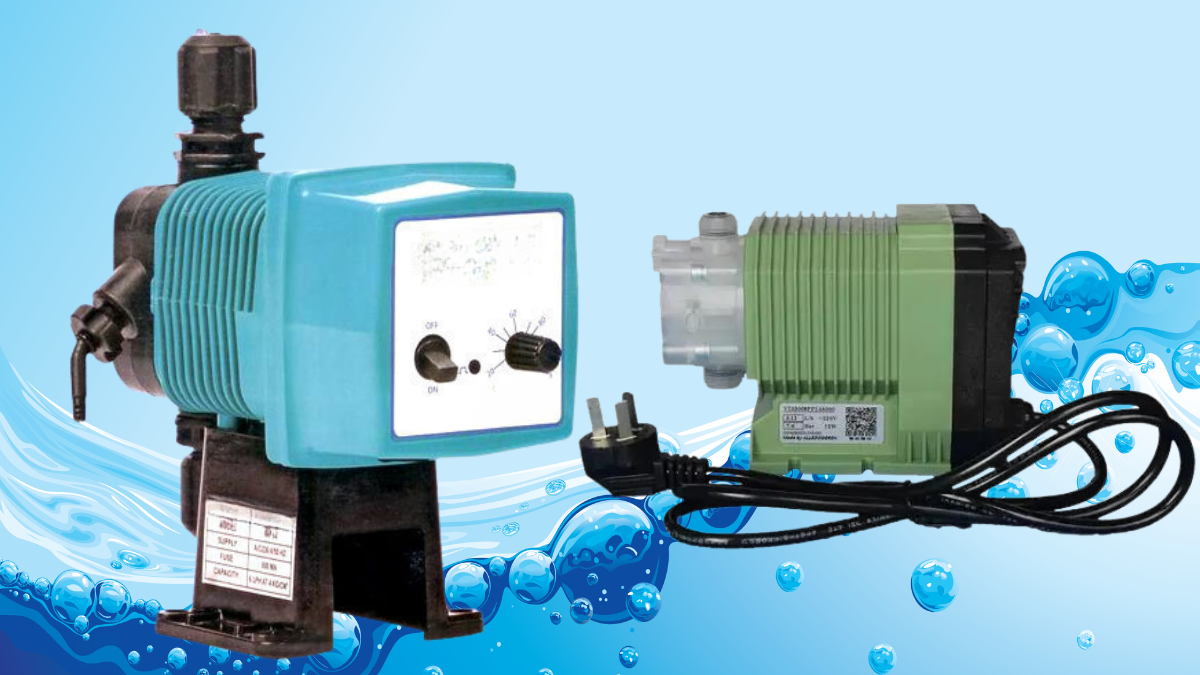Chemical dosing is a systematic procedure of introducing certain chemicals into a system, usually in specified amounts, to produce desired results. The mechanism of chemical dosage differs according to the application. In the context of water treatment, a dosing pump, which is a diaphragm pump, is used to inject the chemical into a flow of water. In this post, we’ll learn more about a dosage pump and what it’s used for, the Types of dosing pumps, and where it is used.
What is a chemical dosing pump?
A dosing pump is a positive displacement pump that is used to inject a chemical or other substance into a flow of water, gas, or steam. Dosing pumps, which are typically modest, enable a highly precise flow rate for complete control. They are at the center of an integrated dosing system meant to disperse chemicals automatically. This dosage definition applies to a wide range of applications and industries, including wastewater treatment and food processing.
How Does a Chemical Dosing Pump Work?
A dosing pump sucks a predetermined amount of liquid into its chamber before injecting the chemical into a tank or pipe containing the fluid being dosed. It is powered by an electric motor or an air actuator and contains a controller that switches on and off the pump and regulates the flow rate. Some models have more complex control systems.
What are the different types of chemical dosing pumps?
Diaphragm Pumps
Diaphragm pumps operate by harnessing the flexibility of a diaphragm to displace the chemical. This dynamic mechanism ensures an accurate and controlled dosing process, making them ideal for applications where consistency in chemical dosage is paramount. Renowned for their exceptional precision, diaphragm pumps offer reliability and accuracy in maintaining desired concentrations.
Peristaltic Pumps
Peristaltic pumps employ a flexible tube to transport the chemical. The pump’s action involves compressing and relaxing the tube, creating a pulsatile but consistent flow. Known for offering a reliable and uniform flow, peristaltic pumps are favored for applications requiring steady and consistent chemical delivery. Their design minimizes the risk of contamination, making them suitable for sensitive processes.
Metering Pumps
Metering pumps excel in delivering fluids with precise and adjustable flow rates. This makes them particularly suitable for applications demanding meticulous control over chemical dosing. Widely recognized for their ability to provide fine-tuned control, metering pumps offer versatility in adjusting flow rates as needed. This precision is crucial in industries where even slight variations in chemical concentration can significantly impact outcomes.
Dosing Pump Applications
Water Treatment: Maintaining safe and healthy drinking water requires the controlled addition of chlorine, pH adjusters, and other chemicals. Dosing pumps ensure precise amounts, safeguarding public health.
Chemical Processing: In the world of chemical reactions, accuracy is paramount. Dosing pumps meticulously deliver specific quantities of ingredients, guaranteeing consistent product quality and optimal yields.
Food & Beverage Processing: From infusing flavors to adding colors, dosing pumps contribute significantly to the taste and visual appeal of our favorite food and beverages. Their precise control ensures consistent quality and avoids product spoilage.
Agriculture: Delivering fertilizers and pesticides with pinpoint accuracy is crucial for maximizing crop yields while minimizing environmental impact. Dosing pumps empower farmers to achieve this delicate balance.
Pool & Spa Maintenance: Sparkling pools and rejuvenating spas rely on the controlled addition of chlorine and other chemicals. Dosing pumps guarantee proper sanitation and a refreshing experience.
Factors to consider when choosing a chemical dosing pump?
When choosing a chemical dosing pump, it is important to consider the following factors:
- The type of chemical being pumped: Some chemicals are more difficult to handle than others. Make sure the pump you choose is compatible with the chemical you will be using.
- The flow rate required: The flow rate is the amount of liquid that the pump can deliver per unit of time. Make sure the pump you choose can deliver the flow rate you need.
- The pressure required: The pressure is the amount of force that the pump can exert on the liquid. Make sure the pump you choose can deliver the pressure you need.
- The accuracy required: The accuracy is how precisely the pump can deliver the desired flow rate. Make sure the pump you choose is accurate enough for your application.
How do I maintain a chemical dosing pump?
Chemical dosing pumps require frequent maintenance to ensure they continue to function effectively. The particular maintenance requirements will vary based on the type of pump you have. However, some basic guidelines include:
- Clean the pump regularly to prevent scale and other deposits from accumulating and causing harm to the pump.
- Inspect the pump for leaks: Leaks may indicate that the pump is not functioning properly and should be fixed.
- Lubricate the pump per the manufacturer’s directions.
- Store the pump according to the manufacturer’s instructions.
Where can I buy a chemical dosing pump?
Searching for a reliable supplier of chemical dosing pumps? Look no further than Refinar East Africa! We specialize in providing top-notch, high-quality pumps in a variety of capacities. Reach out to us today at 0707075702 or email info@refinareastafrica.com for more details and inquiries. Trust Refinar East Africa for all your chemical dosing pump needs


